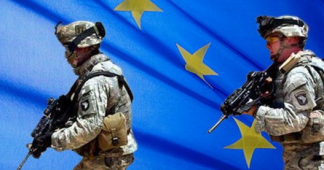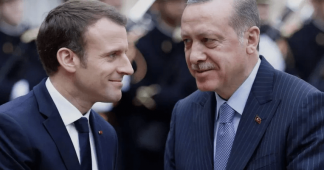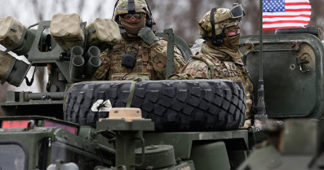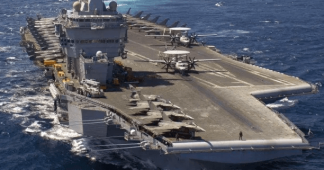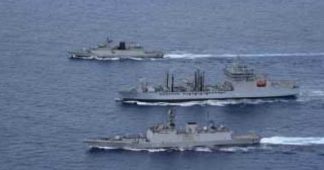By William Mallinson*
September 20, 2021
France’s anger at the US-UK-Australia (AUKUS) deal to build nuclear submarines in Australia is palpable but understandable, since Australia has reneged on a multi-billion-euro contract signed with France to supply twelve submarines to Australia. In an unprecedented outburst, Jean-Yves Le Drian, French Foreign Minister, has accused Australia and the U.S. of ‘duplicity, a major breach of trust and contempt’, recalling French ambassadors for consultations. Dismissing Britain as a ‘third wheel’ indulging in ‘constant opportunism’, he said that there was no need to recall his ambassador to London. Here, the implication is that the post-Brexit UK is not even worth the candle. We shall explore in this article whether France is just huffing and puffing in a face-saving gesture or whether her apparent stance could have major implications for NATO and European defense. But first, a spot of history.
From Gaullism to Inconsistency
In 1966, France left NATO’s integrated military structure and expelled NATO headquarters, which moved up the road to Brussels. De Gaulle had proposed the creation of a tripartite NATO, whereby France, the United Kingdom and the United States would be put on an equal footing for the purposes of discussing nuclear strategy. The U.S. and UK refused, leading to France’s withdrawal. By 1999, however, France was in full fling, joining NATO’s illegal attack on Serbia, though swinging back later, along with Germany, in condemning the illegal invasion of Iraq in 2003. Then, under the Blair-friendly President Sarkozy, France rejoined the integrated military structure of NATO in 2009, playing a major role in destroying Libya two years later. To add to France’s post-Gaullist tendency to vacillate, the nation came to renege on the deal, just before its delivery, to provide Russia with two Mistral helicopter carriers, while having to repay Moscow. The Anglo-Saxon pressure on France in the wake of the Crimea’s return to Russia proved too strong for an allegedly independent France. It can be seen here that France did to Russia what AUKUS is now doing to France, thus suggesting an element of hypocrisy. To add to this French bipolar disorder in her foreign/military policy, President Macron described NATO as ‘brain dead’ only two years ago.
Implications
The big question now is whether France is serious about returning to an independent foreign and military policy. If she sticks to her guns, à la de Gaulle, we could then be witnessing an important shift in the distribution of power in the world and, perhaps paradoxically, an improvement of relations between the EU on the one hand, and Russia and China on the other, notwithstanding NATO cheerleaders like Poland and the Baltic statelets. In (neo-)Gaullist terms, this would imply a supranational and independent EU defense force, with France playing a central role nevertheless, albeit with German consent. To understand this, we need to turn to some more history.
The Cold War and an EU Army
The U.S., initially under British pressure on President Truman, decided that it must control what it could of post-war Europe, although in a more overtly benign non-Stalinist, yet CIA-instigated, fashion. Hence the Marshall Plan, the Brussels Treaty Organization (BTO), the (abortive) European Defense Community (EDC) and the subsequent Western European Union, which served as a politically acceptable bridge to accept West Germany to NATO as a full-fledged member. Moscow was again put on the defensive, as in 1812 and 1941.
A genuinely independent European army would have been unacceptable to the U.S.: even the EDC would have depended on NATO, as Article 6 of the treaty made it clear. NATO was shaken by de Gaulle’s withdrawing France in 1966 from its integrated military structure—but not really stirred—although the Gaullist France continued to annoy the Anglo-Saxons with its balancing policy and thus a friendlier attitude towards Moscow than most dared to entertain.
NATO—but essentially the U.S. and the UK—became increasingly worried at any tendency of the EU going it alone in its defense policies, not only during the Gaullist era but later as well, because of French and German opposition to the invasion of Iraq, which remains a badly damaged country. But Merkel and Sarkozy then went on to betray Chirac and Schröder.
The transmogrification of French and German policies was truly remarkable. Sarkozy, in particular, overturned the traditional Gaullist policy of independence, bringing France back into the integrated military structure of NATO. Since then, the EU has essentially been a strategic Cold War tool of the U.S., supported in particular by Poland, Latvia, Estonia and Lithuania as well as by France and Germany, however, in a more lukewarm fashion.
Some half-hearted attempts were made to give the EU a more independent military identity, hence the European Security and Defense Initiative/Policy/Personality (ESDI/P). This was still to be subject to NATO, since it would only operate in areas where NATO was not engaged. In other words, with NATO agreement. The manic NATO-sponsored EU-enlargement of 2004, virtually synonymous with NATO enlargement, turned the embryonic and battered European defense identity into a damp squib: first, the West European Armaments Group (set up in 1976) died in 2005. Then, the West European Armaments Organization, set up in 1996, died in 2006, probably to be followed by the still existing European Defense Agency. Then, in 2009, the ESDP was subsumed into the Common Foreign and Defense Policy. All these acronymic gyrations were, of course, meant to give expression to the Treaty of Maastricht’s (1992) Common Foreign and Security Policy (CFSP).
If anyone is feeling slightly confused by now, then you have understood: it is indeed a confusing story, characterized by disorganization and a lack of leadership, which naturally suits the U.S. military-congressional-industrial complex, whose main aim, some would think, is to demonize Russia and China as well as create a war on terror—if selective—in order to emphasize NATO’s primacy over the EU. To add to the lack of leadership, it is important to remember that there is little agreement among the countries that belong to both the EU and NATO, with Greece, Cyprus and Turkey being prime examples. To complicate matters further, Austria, Finland, Ireland, Malta and Sweden are members of the EU but not of NATO, although the U.S. would dearly love to welcome them in. Then we have the NATO-member Norway, which is not in the EU, and, of course, Cyprus, which is in the EU but not in NATO, although it has to be said that because of the British-occupied parts of Cyprus, the latter’s territory is de facto in NATO.
It is time to make a perhaps obvious point: as the Ukraine experience has shown, and is showing, the U.S. is paranoid about a Russia-friendly EU, since that might lead not only to the end of NATO as we know it, but even to a genuinely European supranational force in a few years’ time, which is friendly towards Russia and which will promote European defense industries to the obvious detriment of U.S. shareholders in arms companies. The U.S. is nevertheless quite happy to encourage and sponsor EU defense initiatives, only as long as they are directed against Russia and controlled by Washington in one form or another, as history demonstrates.
The possibility of the twenty-eight EU members actually agreeing to a supranational army is a pipe dream, since Poland and the Baltic statelets, at the very least, would never agree to sever military links with the U.S. Britain, which would never contemplate severing its military links with the U.S., can be guaranteed to fight tooth and nail, together with its strategic master, against a supranational European army.
This may result, however, in the interesting possibility of a two-tier Europe, at least in defense, led by the Franco-Germans: an inner core with its own defense and spending, probably friendly towards Moscow, with its own European standardized weapons, to the chagrin of U.S. shareholders; and an outer core of U.S.-friendly and Russophobe states. We should be reminded here that the first thing that Poland did on entering the EU was purchase 4 billion dollars’ worth of U.S. military aircraft, infuriating European manufacturers. With a strong Russia and an EU army independent of NATO, however, it would only be a matter of time before Poland and the Baltic states accepted the reality to join the EU army or declare themselves neutral.
The alternative to the EU military independence is an EU that continues to obey U.S. diktats, with the concomitant threat to world stability, through a profit-mad arms race. Here, we can recall how France succumbed to U.S. pressure, breaking its contract with Russia to deliver two helicopter carriers, when they had been built and were about to be delivered. This obviously connects to U.S. pressure on Germany to destroy the North Stream II gas pipeline, even though it now only needs the final German go-ahead.
Recent developments suggest that France and Germany are both worried about U.S./NATO muscle-flexing: they were recently reported by Bloomberg to have dismissed as ‘provocative’ Washington’s pressure on them to perform naval drills near the Kerch Strait. Perhaps, we are seeing a slow return to some sort of sanity. The expediently independent attitude of the Italian government is also one encouraging sign. They are, for example ignoring Washington’s threats and are pushing to join China’s Silk Road. All roads lead to Rome, as they say.
At any event, only history exists: it was William Pitt the Younger who, arguably, began the Cold War by criticizing Russia in 1791 for wishing to dismember the Ottoman Empire. The hysterical anti-Russian mentality is still with us today. It was always more anti-Russian than anti-Communist, the latter being an excuse to feed to the masses, in order to disguise hard-nosed business interests.
French Options
In the immediate term, France could offer to sell China some nuclear submarines, delivering a major slap in the face to the Anglo-Saxons. China represents France’s largest bilateral trade deficit (€29.2 billion in 2018). A major military sale to China would offset the trade imbalance. This putative sale is, however, unlikely, as France is apparently concerned at China’s stance regarding the South China Sea. Yet, only ten years ago, the Deputy Chief of General Staff of the Chinese People’s Liberation Army (PLA), Ma Xiaotian, remarked that the two countries enjoy a high degree of mutual political trust, and the bilateral economic and trade co-operation between them is rapidly expanding. He further said that the Chinese side was willing to work together with France to develop the Sino-French comprehensive strategic partnership.
For now, however, direct French military assistance to China is unlikely, if anything because France still has Pacific interests that are incompatible with China’s. Thus, in the wake of the AUKUS deal, France is more likely to further enhance its military co-operation with India. India and France had already decided to intensify defense co-operation early this year, with Paris offering to shift production of Panther medium-utility helicopters as well as 70 per cent of the assembly line for Rafale fighters under the ‘Make in India’ rubric, accompanied by a full transfer of technology. It is eminently possible that France’s military co-operation with India annoyed the U.S. military-industrial-congressional complex, and it may well have justified the AUKUS deal in Washington’s and London’s minds.
To conclude
Prediction is a risky game, especially given the vagaries of individual and corporate human behavior. We may, however, be witnessing a French-led latter-day Gaullist attempt to clip the wings of Anglo-Saxon and NATO attempts to continue/restart (depending on your view) the Cold War. The aim would be to establish a multipolar world, with enough checks and balances to prevent illegal attacks on sovereign states, à la Belgrade, Libya and Iraq.
* Ph.D., Professor of Political Ideas and Institutions, Università degli Studi Guglielmo Marconi
Published at russiancouncil.ru
We remind our readers that publication of articles on our site does not mean that we agree with what is written. Our policy is to publish anything which we consider of interest, so as to assist our readers in forming their opinions. Sometimes we even publish articles with which we totally disagree, since we believe it is important for our readers to be informed on as wide a spectrum of views as possible.
